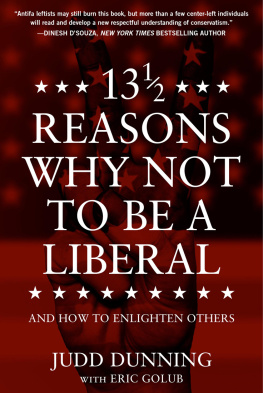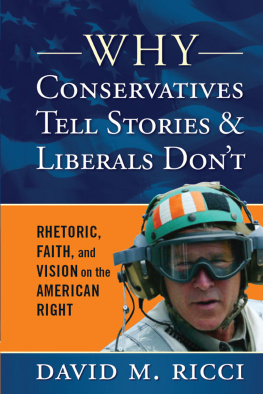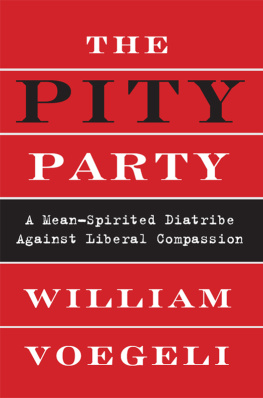
More Advance Praise for
13 Reasons Why Not to Be a Liberal
So glad I was able to cajole Judd into actually finishing 13 Reasons Not to Be a Liberaland How to Enlighten Others during the taping of Bulletpoints (our web series on YouTube) for a year! Well worth the wait!
Michael Loftus, Fox regular, The Loftus Party, Freedom to Laugh Comedy Tour, TV writer of Anger Management and Kevin Can Wait
Judd Dunning not only empowers conservative readers with the critical thinking and forensic tools to survive a liberal rhetorical onslaught, but also enables them to emerge from the battle with a convert or two as well.
Lowell Cauffiel, New York Times Bestselling Author of House of Secrets
My new lucky number is 13, because of Judd Dunnings eye-opening, insightful new book. If youre a conservative or want to be, this is a must read!
Seth Swirsky, no. 1 hit songwriter, four-time Bestselling Author, and Award-winning Documentarian
The best teachers of enlightenment are those whove once lived in darkness. As a former liberal, Judd Dunnings book, 13 Reasons Not to Be a Liberaland How to Enlighten Others, is an important tool that can potentially help you save family or friends duped by the (very) evil forces of the world. And after the onslaught of 2020, we all need as much help as we can get!
Ann-Marie Murrell, Bestselling CoAuthor of What Women Really Want and PolitiChicks: A Clarion Call to Political Activism and editor/owner of PolitiChicks.com
13 Reasons Why
Not to Be a Liberal
And How to Enlighten Others
JUDD DUNNING
with Eric Golub

Humanix Books
13 Reasons Why Not to Be a Liberal
Copyright 2021 by Humanix Books
All rights reserved.
Humanix Books, P.O. Box 20989, West Palm Beach, FL 33416, USA
www.humanixbooks.com | info@humanixbooks.com
No part of this book may be reproduced or transmitted in any form or by any means, electronic or mechanical, including photocopying, recording, or by any other information storage and retrieval system, without written permission from the publisher.
Humanix Books is a division of Humanix Publishing, LLC. Its trademark, consisting of the words Humanix Books, is registered in the Patent and Trademark Office and in other countries.
ISBN: 978-1-63006-173-9 (Hardcover)
ISBN: 978-1-63006-174-6 (E-book)
Printed in the United States of America
10987654321
Contents
Introduction
The Belly of the Beast
T he disturbing 11 p.m. phone call came from my good friend Larry during the second term of the Obama administration. Ironically, he called when I was watching an episode of the conflict-ridden political drama House of Cards.
He got right to the point. Judd, I want to give you the dignity of calling before I delete you from my Facebook, my phone, and my entire life.
I laughed. I thought he was joking. Id known Larry for a good 10 years. We met through a circle of friends and shared the highs and lows of working in the entertainment industry. Larry had an unconventional show-business angle. He was a performer in a popular female impersonator showcase where he and his fellow players impersonated female actresses and celebrities. The shows were full of raucously funny song and dance numbers. I valued Larrys friendship. Knowing him had helped me understand the difficulties of being a gay man, even in liberal Hollywood.
Hey, Larry, I said. Great to hear from you. Its been a while, buddy. I hope youre well.
He wasnt doing well. He was near tears and so upset that he was whispering. Hed been reading my Facebook posts. He said, I need to know if the horrible things you write challenging our President Obama and our country are really youor is this just some type of act? Hed read that I believed in free markets, a strong military, gun rights, preservation of traditional family values, and religious freedom. He also knew that I opposed Obamacare and wanted more research on climate change.
I took a breath and tried to meet him on common ground. I acknowledged how inherently positive it was that Obama was the first black president, and how his election could potentially help heal the racial divide that had been ever present in our American history. However, I didnt ask Larry any questions about his own beliefs. Instead, I went on to tell him how I struggle with certain liberal policies and why I believed the way I do on the topics at hand. I did so awkwardly, offering a lot of broader opinions with few facts. To his credit, he listened.
Then he hung up. I havent heard from him since.
The call was just the beginning of a seismic shift and an oncoming wave. I began hearing snide comments about me from liberals at parties. Others I knew stopped returning my calls. Other Facebook friends dropped me. Even then I wasnt aware that this was just the tide sucking back from shore. The rejection tsunami would soon come with the election of Donald Trump.
What followed threatened to be emotionally traumatic. I dont reject liberals for being progressives. All are welcome in my circle. It seemed outrageous that I could lose more than 2,000 people off of my Facebook page simply because I expressed my political views. People started calling me an idiot and a bigot. On some existential level I was faced with a sense of abandonment, that I was fatally flawed on some conscious or unconscious level. I could have believed this had I not heard similar stories from other conservatives, libertarians, and even moderate Republicans who were experiencing the same rejection.
I concluded that the rejection wasnt personal. It was universal.
It got me thinking about my own and my familys political journey. I come from some very old school Americans. The Dunnings landed in 1770 fleeing British oppression and moved to Tennessee and Virginia, fought the British in the American Revolution, and fought on both sides of the Civil War. The other side of my family was made up of the Whitners and Kresges. The Whitners arrived in South Carolina in 1764 after fighting on the American side of the Spanish-American War. After the war, part of the family moved to Cuba in 1898 as cattle ranchers. When Fidel Castro overthrew Fulgencio Batista and seized my familys ranch, they fled communism and came back to America. The Kresges arrived in 1906 via Ellis Island from the Polish-Ukraine border. They escaped the violent pogroms to seek a new way of life in Massachusetts and later New York. Although I came from a historically Republican household, my parents rarely discussed politics. As I grew up in the 1970s and 1980s, politics still had considerable ongoing conflicts. Yet life seemed much more private than today. Ones personal politics were not yet used as a key litmus test of who to have in your life, work, or social circle.
Full of youthful idealistic sentiments and low on facts, by default, I became a big-hearted superliberal (back then, I was just called a Democrat). The Ivory Tower only fueled the fire. Not one of my Colorado State University professors spoke positively of our country. I earned my bachelors degree in social science and economics, declared myself prelaw, and took the LSAT. My plan was to work for the American Civil Liberties Union (ACLU) to fight injustice and racism.
Right before law school and increasingly disgusted with our country, I opted not to stay in school. I was full of anger fueled by socialist ideals and utopianism. Ironically, those same years saw President Ronald Reagan empower our country. Reagan had engineered a new era of greater national security and booming prosperity, but I wanted none of it.
Next page








